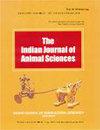Effect of dietary supplementation of rice dried distillers grains (rDDGS) on blood profile in Barbari goats
IF 0.3
4区 农林科学
Q4 AGRICULTURE, DAIRY & ANIMAL SCIENCE
引用次数: 0
Abstract
The present study was carried out to determine the effect of feeding different levels of rice dried distiller grains (rDDGS) on haemato-biochemical profile of Barbari goats. Twenty-four Barbari goats of 1-2 years of age were randomly divided into four groups (Control, T1, T2 and T3) having six animals in each group. Barbari goats in control group were fed with basal diet comprising of wheat straw, chaffed green maize fodder and compounded concentrate mixture in a ratio of 20:30:50. The animals in T1, T2 and T3 groups were fed with basal diet supplemented with 10, 20 and 30% of rDDGS on dry matter basis, respectively for the period of 90 days. Results revealed no significant differences on blood profile except WBC (×103/µl), neutrophil (%) and lymphocytes (%) in the groups supplemented with rDDGS. Total protein was found highly significant in T2 group followed by T1 and T3 groups. Total immunoglobulin, catalase, TBARS and ALT in rDDGS supplemented groups were also found significantly different. It was concluded that rDDGS can be incorporated in Barbari goat ration up to level of 20% without having any detrimental effect on health of goats.饲粮中添加干酒糟(rDDGS)对巴巴利山羊血液特征的影响
本试验旨在研究饲喂不同水平稻干酒糟(rDDGS)对巴巴利山羊血液生化的影响。选取24只1 ~ 2岁的巴巴利山羊,随机分为4组(对照组、T1、T2和T3),每组6只。对照组山羊饲喂由麦秸、糠秕绿玉米饲料和复合精料混合物组成的基础饲粮,比例为20:30:50。T1、T2和T3组分别饲喂在基础饲粮中添加10%、20%和30%干物质rDDGS的试验饲粮,试验期90 d。结果显示,除了白细胞(×103/µl)、中性粒细胞(%)和淋巴细胞(%)外,rDDGS组的其他血液指标均无显著差异。总蛋白以T2组显著,T1、T3组次之。rDDGS添加组总免疫球蛋白、过氧化氢酶、TBARS和ALT也有显著差异。综上所述,rDDGS在巴里山羊日粮中添加20%的水平下,对山羊的健康没有不良影响。
本文章由计算机程序翻译,如有差异,请以英文原文为准。
求助全文
约1分钟内获得全文
求助全文
来源期刊

Indian Journal of Animal Sciences
农林科学-奶制品与动物科学
CiteScore
0.60
自引率
25.00%
发文量
220
审稿时长
8 months
期刊介绍:
Articles published in The Indian Journal of Animal Sciences encompass a broad range of research topics in animal health and production related to cattle, buffalo, sheep, goat, camel, equines, pig, rabbit, yak, mithun, poultry and fisheries. Studies involving wildlife species and laboratory animal species that address fundamental questions about their biology will also be considered for publication. All manuscripts must present some new development and must be original, timely, significant and scientifically excellent. Papers will be rejected if standards of care of, or procedures performed on animals are not up to those expected of humane veterinary scientists. At a minimum, standards must meet the International Guiding Principles for Biomedical Research involving Animals, as issued by the Council for International Organizations of Medical Sciences. (C.I.O.M.S., c/o WHO, CH 1211 Geneva 27, Switzerland). Articles reporting new animal disease must follow GOI directive as given in detail in Guidelines to Authors.
 求助内容:
求助内容: 应助结果提醒方式:
应助结果提醒方式:


